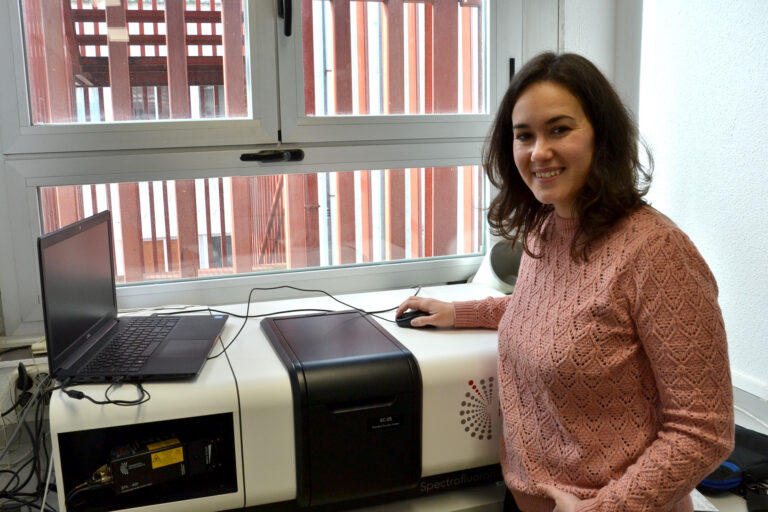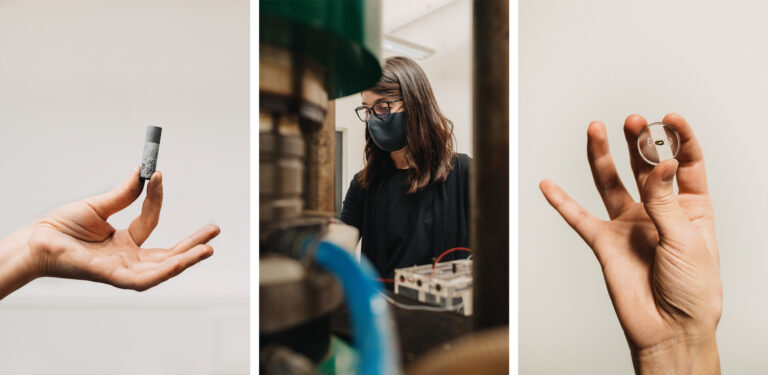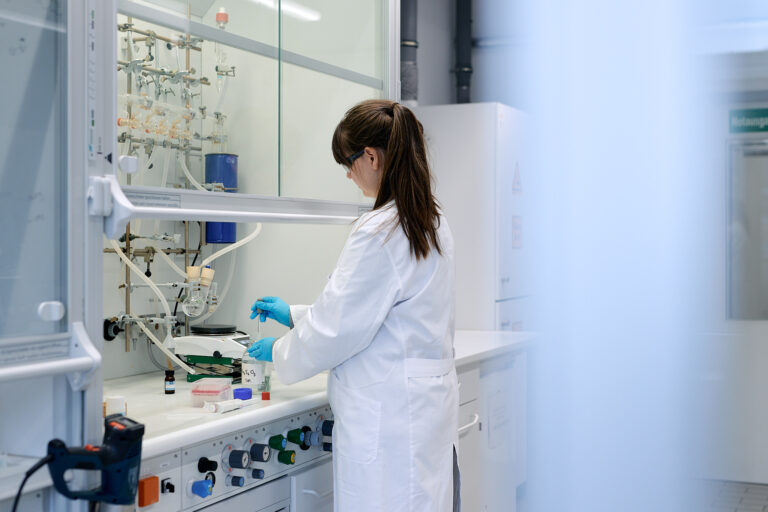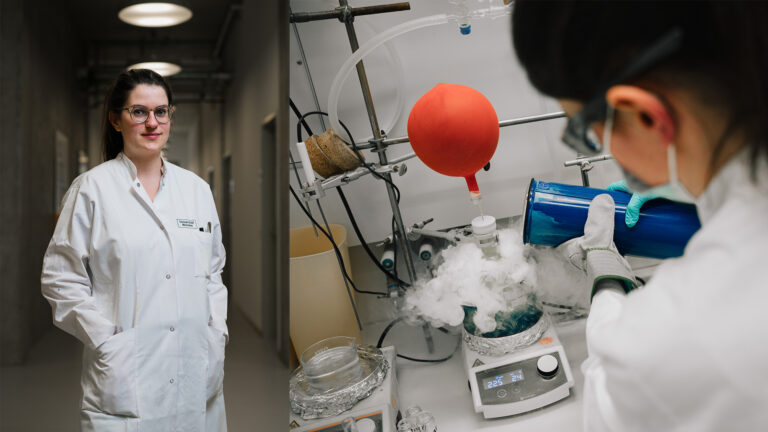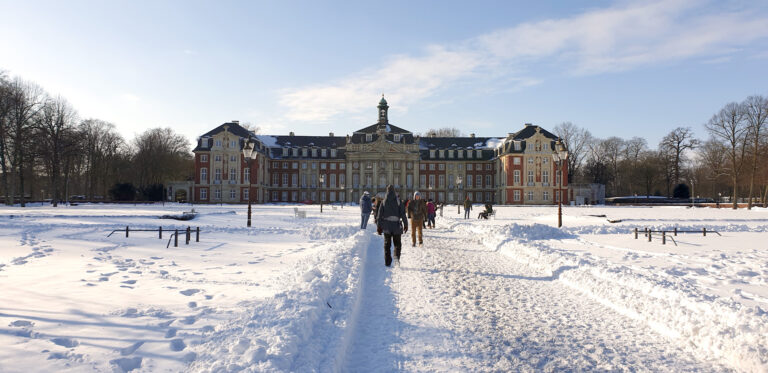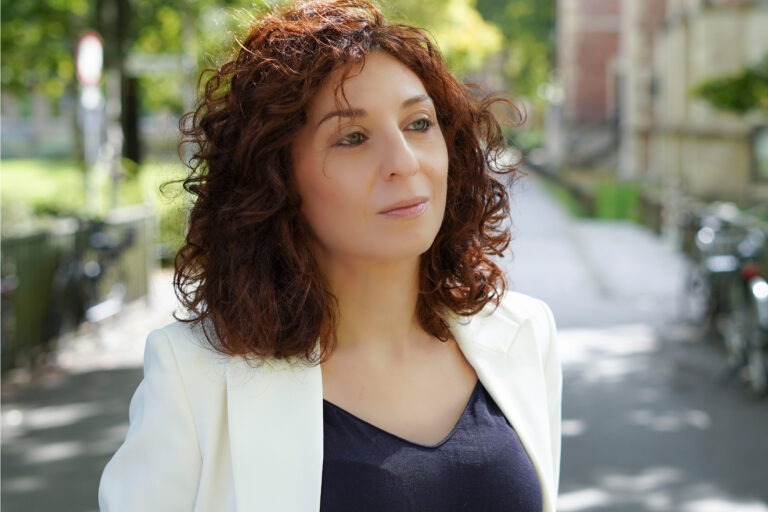
Lemurs, Cuttlefish, and Turtles – Oh My! An Interview with Animal Biologist Dr. Pauline Zablocki-Thomas
In the series “33 questions” we introduce, in no particular order, our WiRe Fellows who are currently working on a research project here at the University of Münster. Why 33? Well, if we think of the rush hour of life, it is kind of the age that lies in the middle. And we also like the number😉.
In today’s episode we are speaking with Dr. Pauline Zablocki-Thomas, researcher in animal behavior and passionate lover of primates and many other animals.

1. What motivated you to work in the field of animal behavior?
I love watching animals and being in close contact with them. I always wanted to understand them better, and thought, why not also be able to communicate with them?
2. Describe your research topic in three words.
Animals. Personality. Sociality.
3. A good animal biologist needs… ?
It is a bit paradoxical, but I think conducting thorough research in animal behavior requires the ability to think like the animals themselves in order to understand them better. One must attempt to put themselves in the animal’s shoes, so to speak. Alternatively, when studying a specific species, it is also interesting to consider what their predators or prey might sense to gain a more comprehensive perspective. The most challenging aspect is getting close to the study species without disturbing them, ensuring that we witness their natural behaviors undisturbed.
4. Describe your daily work in three words.
Watching. Waiting. Analyzing.
5. What does a typical (work) day look like for you?
It’s not always easy, because even when studying animals in the lab, a lot of equipment is needed for filming, recording, and setting up specific experiments. Even with captive animals, they may not always cooperate and sometimes bypass the setup or remain still, leading to a lot of clean-up work. However, the uniqueness of each day lies in the different reactions of individual animals, which is particularly fascinating when studying their personalities.
In summary, the process involves gathering materials and setting up the experiment, working with the animals or waiting for the experiment to conclude, followed by cleaning up and entering and saving data. Additionally, there are other tasks such as checking emails, reading research papers, and writing articles.
6. What is the best experience you have had as a scientist / researcher?
It was a field internship in Madagascar, specifically in the Kirindy forest. During my master’s degree, I conducted research on mouse lemurs and dwarf lemurs in their natural habitat. Every afternoon, I set up live traps in the trees filled with bananas, and at night, I collected the trapped animals to conduct my tests alone in the forest. It was an incredible experience to immerse myself in nature during the night and encounter fascinating animals like nocturnal lemurs, fossas, giant jumping rats, and more. The sounds of their calls filled the air, creating a surreal ambiance. However, it also presented challenges, such as avoiding the presence of large moths attracted to the flashlight on my head. It was quite disconcerting to notice the glowing eyes of nocturnal spiders on the ground as well. And I enjoyed every bit of it!
7. What was your biggest research disaster?
I was working with a cohort of 30 young cuttlefish. They all died one after the other for unknown reason.
8. If possible, which (historical) important scientist / researcher would you like to have dinner with? What would you ask?
Charles Darwin. I would ask more details about his adventures around the world.
9. What keeps you motivated in your work day in and day out?
I am really happy when people talk to me about my articles and cite it. It tells me that it is worth it and that I am doing a good job.
10. If time and money were no object: Which research project would you like to do?
I would create a preserve for local animals to study those that live nearby.
I would follow animals in the wild. Setting camera traps everywhere to know what is going on when I am not there, see the interaction between the individuals and between the species.
I would be able to study the personality of animals in the wild, especially nocturnal species.
11. What is your favorite research discipline other than your own?
Conservation ecology and Botanics. I always wanted to participate to conservation efforts and at the same time understand the ecosystems better in order to make those efforts valuable for plants and animals.
I always wanted to know all the names of the plants and insects that I find around me.
12. What do you consider the greatest achievement in the history of science / research / your field?
The acknowledgment by scientists that animals have emotions.
13. Which experience in the world of science disappointed you most?
Experiments involving infant and mother separation were conducted until recently with macaques.
14. What was the funniest moment you had in science?
There is always this pivotal moment when you study primates who can use tools. You learn that they can steal your material and crush it with two stones!
15. How did you survive your PhD time?
A lot of sport, especially with my co-PhD and my partner. Living with a supportive partner who was also doing a PhD also helped. Very important too: going on vacation like in any other job! (5 weeks per year in France).
16. What advice and tips do you have for future PhD students?
Your physical and mental health is more important than your PhD.
17. What direct or indirect relevance does your research have for society?
Understanding how individual animals cope with different contexts based on their personality is crucial for the quality of scientific research and colony management, and will directly help the host laboratory. On a more fundamental perspective, how different personalities influence each other will help us to better understand the dynamics of personality changes in a social context. In addition, there is a growing demand from the society to take better care of individual animals kept in captive settings, and understanding their personality will promote our ability to provide the best rearing conditions for captive animals.
18. How did you imagine the life of a scientist / researcher when you were a high school student? Is it actually different? In what way?
I had absolutely no idea. I was probably thinking that it was someone constantly in a lab with a pipette in the hand!
A scientist is always reading and writing papers (or grant applications!). Not so much pipetting involved for me.


19. What do you like most about the “lifestyle” of a scientist / researcher? And what least of it?
The pros are the flexibility and travels: you can choose when you work, and you can visit other researchers and go to conferences for work. You decide what you are studying.
The cons are that it is very hard to disconnect from work. The research field is very competitive and I feel that’s a lot of pressure. So personal life and work life balance is very challenging to keep.
20. What is the biggest challenge for you when it comes to balanicing family and career? How do you master this / these challenge(s)?
I can never disconnect without feeling guilty. I also have less free time or working time than a person without children. Having time and energy for both is the main challenge.
I set times that are dedicated to work at the office/lab. All the rest is only dedicated to my family.
21. If you were the research minister of Germany, what would you do to improve the situation of women in science?
I am not sure for Germany, but for Europe in general I would set equal parental leaves for both parents, or at least one year of parental leave that they can share how they wish. (Comment of the WiRe Team: WiRe Team note: In Germany, paid parental leave of up to 14 months without work obligations can be flexibly divided between both parents).
22. Do you think your career would have evolved differently if you were a man?
I would probably have been less subject to some health problems and be more productive sometimes. Of course, I would not have experienced pregnancy, which is also quite challenging for brain functions. Other than that, I never felt any kind of discrimination based on my gender, and it did not prevent me to go anywhere I wanted to conduct research.
23. How did you imagine your future as a child? What profession did you want to pursue? And, now looking into the future, where do you see yourself in 10 years?
I always wanted to work with animals, so like many kids I taught I wanted to be a vet. Then I realized I was more interested in watching and understanding them, that’s why I finally preferred research.
As for in 10 years, I am not sure. Probably in France and working at the university. But I think someday I will be willing to move abroad again to have another work and life experience. But I am hoping that it will still be for research or science purposes.
24. How do you keep your head clear when you are stressed?
I look at pictures of my kids.
25. What is your favorite German word? Why?
Schildkröte (Eng: turtle). That’s silly, but with a French accent it sounds really funny.
26. What makes you most happy about the world? And what worries you most about the world?
I see more and more people fighting for the environment, people completely dedicated to that. I wish I could be like them and I admire their courage.
However, we continue to see nature loss and its consequences for the well-being of living creatures.
27. Who or what inspired you to become an animal biologist?
I have always admired Jane Goodall and her two equally brave fellows, Diane Fossey and Biruté Galdikas, who were sent into the forest to observe chimpanzees, gorillas and orang-outans. That’s how I imagined the work of a true primatologist.
28. Which of your traits bother you the most in your daily work? And which of your traits help you the most in your daily work?
Lack of energy. Sometimes I don’t have the energy to get of my desk chair and go collect data.
The most helpful? Definately being organized.
29. Which hobby have you given up for a life in academia?
Video games. I had to give up on this time consuming hobby. I am looking forward to retirement to catch up on all that I have missed!
30. If you could travel in time: in which epoch and at which discovery or event would you have liked to have been there?
I am not a nostalgic person. I would go in future in a time when we found a truly clean source of energy, one that is available for everybody.
31. What are the advantages and disadvantages of doing a remote-WiRe-fellowship?
I can stay close to my family, but I am sure I am missing a lot of nice networking events in Münster. Here I have a direct access to the animal model that is relevant for my research project.
I would have loved to be in Germany and practice my German and put my kids at a school where they could speak German or English.
32. What is your favorite place to relax from research?
Any woods where I can do some running.
33. If you could change one thing about the academic system in which you have last done research in, what would it be?
Of course I would make scientific articles free to anyone.


